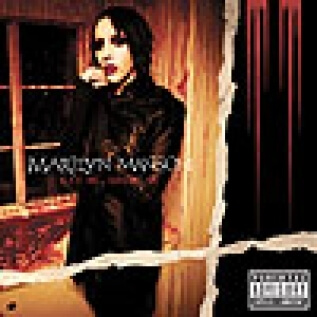Every artist has its hard times in personal life, as well as heavy creative crises. It looks like that day has come for Marilyn Manson now, when he has to depend just on fanhood to keep his fans looking up to him. Only the fact that “Eat Me, Drink Me” is “the new Manson record” keeps it on the edge of complete downfall and prevents it from falling into the abyss.
“Eat Me, Drink Me” is for sure the poorest album by Marilyn Manson so far. I can’t speak against my conscience and say that I didn’t expect it after the confusion “The Golden Age of Grotesque” brought a few years ago. Then everyone felt the whiff of mainstream that streamed from it, nevertheless Manson kept his heart in the right place and presented us with another portion of heavy, sadistic revelations, though a little digested already.
In the new album the focus is taken off the style, so that Brian Warner (the person behind the pseudonym Marilyn Manson) could come into the spotlight with his human problems and emotions despite the mask of the blasphemous singer that has taken over his person. After all these years we’ve been exploring Manson’s corrupted mind and soul through his music, for the first time we have the opportunity to see a simple and plain version of him, without the stage make-up and behaviour. In an interview for “Rolling Stone” magazine, Manson said that the new songs are written to seduce and acknowledged that he doesn’t want people to think the album is an exploitation of his personal life, as well as that it does represent who he is and how he feels. Taking the year that Brian Warner lived through, we can’t really blame him for making more space in his music for himself. After all, that’s the artist’s only vent.
In the previous releases the oppressive ballads were the charm we were looking for amongst the brutal smashing songs. In “Eat Me, Drink Me” you won’t find blasting metal massacres, but the ballads are plenty. Actually too much.
On first reading the songs are unvaried and slur together as if it is the first time you’re listening to Manson. On the second on, they’re still unvaried and banal structures start to show. On following plays one starts to hear the shades in the pattern. This is maybe the first time to find the ideas of lovelessness, insecurity, pain and ephemera put out in such literal and direct manner in Manson’s work and not in the usual grotesque way, lightly scoffing at the world. Apparently his divorce with Dita Von Teese has been even more unexpected to him than to his fans and caught him off-guard. Manson himself says that he has been in a miserable psychological condition with suicidal fits and “had nothing to attach to”.
That’s when the title comes, “Eat Me, Drink Me”, inspired by the recent scandal with the man who posted an ad that he wanted to be eaten and the guy who responded to that ad… Marilyn Manson considers that those two Germans, as well as he himself, have considered that romantic in some sick way, which is the partial idea of the album – to sound romantic. In his desperation Manson discovers that “there’s a big difference between wanting to die and not wanting to live”. Since he had neither the goal of dying, nor the strength to do it, it looks that his last consolation laid in the music right when he was on the verge of giving it up for good.
The melancholic, powerless, desperate moods that gave birth to “Eat Me, Drink Me” are the side of the prism that the album is – one idea with many readings and colours depending on the light you play on it.

